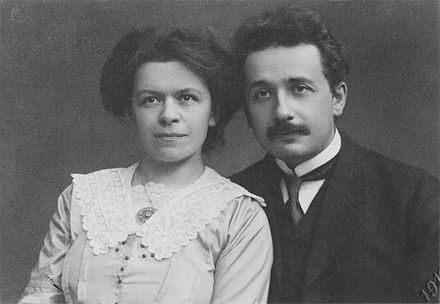Fantasies
The Thin Line Between Fiction and Fact
When is it OK in a novel about famous people to make stuff up?
Posted September 2, 2016

I began reading, with warm anticipation, The Other Einstein: A Novel, by Marie Benedict. It was loosely based on what little is known about Einstein’s first wife, Mileva Einstein, and her relationship with one of the greatest scientists in history. Benedict’s take on the Einstein story commenced with promise as the two students, Albert and Mileva, began their friendship, their sharing of a passion for science and mathematics (Mileva’s field), and the blossoming of their love. Einstein came across as delightful and eccentric, and unlike many men of his time, not a man who discriminated against intelligent women; quite the reverse in fact. However, in the novel their apparently equal relationship quickly deteriorated when Albert did not include Mileva’s name on his first important papers, in spite of the ‘fact’ that he and Mileva had worked on them together, and indeed that Mileva had apparently contributed more than Albert.
The real facts are that although there has been speculation that she might have contributed something to these papers, the resounding and most parsimonious conclusion is that she did not and could not have contributed in any significant way, in the sense that there is little evidence that she had the giant intellect and training to think through concepts as unique as these. This is not to say she wasn’t a highly intelligent woman and mathematician, nor that her gifts weren’t put on hold by Einstein’s rise to the top (supported by the beliefs of the day that a woman’s place was in the home, especially once children were born). However there are few people of either sex who could hold a candle to Einstein’s intellectual achievements. So even although this is a novel, I think it strays too far in this respect. Most readers of The Other Einstein not intimately acquainted with the facts about Einstein’s life will definitely get the impression that Mileva was robbed of her right as an author on these papers (and of the Nobel prize later). Albert Einstein is far too giant a figure to sacrifice in this way, even in fiction.
However, this is not as serious a speculation or fictionalization as the depiction of Einstein’s treatment of Mileva as the years went by and he became more famous and she withdrew into the world of motherhood and looking after the home and her husband. Albert’s increasingly humiliating treatment of Mileva is shocking, and a reader who forgets that this is fiction would be hard put not to revise any positive or even neutral views they previously had of the man who, along with Darwin, is probably the best known scientist the world has ever known. As far as I know there is no evidence for this dark change in Einstein’s personality and treatment of his wife. Indeed it doesn’t fit with what we do know of Einstein from writings of his friends and so on. Of course it could be true, or partly true; we will probably never know. Certainly there are plenty of instances of a powerful man treating his wife badly in private and yet outside the marriage everyone thinks he is wonderful. It is a fact that Einstein had a long affair with his cousin and later married her. It is also a fact that he signed a divorce agreement giving all of the prize money of his forthcoming Nobel Prize to Mileva to support her and their two sons (whom he continued to love and spend time with). Neither of these facts suggest the extreme behavior he displayed towards Mileva in this fictional portrayal. Again my issue is that Einstein is not a fictional character, and to denigrate him like this, even in fiction, is going too far.
The biography of the author, Marie Benedict, tells us that she is a lawyer with more than ten years' experience as a litigator at two of the country's premier law firms, a magna cum laude graduate of Boston College with a focus in History and Art History, and a cum laude graduate of the Boston University School of Law. In her notes at the back of the novel she does make it clear that the facts at her disposal that refer to the relationship are largely the places where the couple lived and when, and where Einstein worked, rather than anything more personal.
Benedict is well-educated in law and history, but this was a story that cried out for skillful writing about science, given that Mileva was apparently a woman who was passionate about it. Benedict’s theme was primarily about Mileva’s disastrous relationship with a powerful man, but surely no woman with her apparent knowledge of science (a woman who in this novel believed she should be a co-author of Nobel-prize-winning ideas!) would think (or not think) about science in the way portrayed here. Benedict made an attempt to bring Einstein’s ideas into the story here and there, but it was clumsy, and it suggests she had little understanding of the difficult concepts she was attempting to summarize. She admits her lack of science background in her author’s notes, but this perhaps suggests that either she should have co-written the novel with (or have had it edited by) a science writer with a good knowledge of Einstein’s work, or that she should have chosen another subject.
So to conclude, given that this novel is as much about Albert Einstein, and indeed who wrote his papers, as about the little-known Mileva, I think readers should be alert to the extensive speculation behind this novel, and understand that there is little or no evidence to support the other side of Albert Einstein as he is portrayed here. It would have been fairer to Einstein to place the author’s notes at the beginning and not the end of the novel, so the reader goes into the story knowing this really is Fiction with a very large ‘F’. Finding this out at the end is better than not finding it out at all, but I suspect many readers don’t bother with the author’s notes, as would seem clear by the many reviews of her book by readers who expressed horror about Einstein’s behaviors. The novel Behave, about John Watson and Rosalie Rayner I discussed in my first post, Behave! in this series was, in my opinion, a much better story because it did not stray too far from the known facts, especially when the less than desirable behaviors of the main characters (who were, after all, real people) were “fictionalized.” That novel, also based on the marriage of a famous scientist to a woman who was closely involved in his work, and told from the woman’s point of view, was written in a more believable and empathetic way.
Please subscribe to my monthly e-newsletter!


